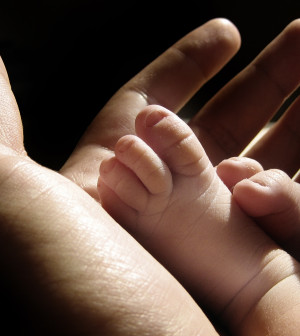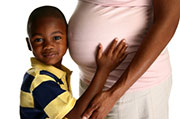- Double Mastectomy May Offer No Survival Benefit to Women With Breast Cancer
- Toxic Lead Found in Cinnamon Product, FDA Says
- Certain Abbott Blood Sugar Monitors May Give Incorrect Readings
- Athletes Can Expect High Ozone, Pollen Counts for Paris Olympics
- Fake Oxycontin Pills Widespread and Potentially Deadly: Report
- Shingles Vaccine Could Lower Dementia Risk
- Your Odds for Accidental Gun Death Rise Greatly in Certain States
- Kids From Poorer Families Less Likely to Survive Cancer
- Tough Workouts Won’t Trigger Cardiac Arrest in Folks With Long QT Syndrome
- At-Home Colon Cancer Test Can Save Lives
Babies May Remember Words Heard Before Birth


MONDAY, Aug. 26If you feel like talking to your fetus in the womb, a new study suggests you should: The research finds that babies develop a memory of words they hear frequently before they are born.
“We believe this shows how well the brain at this age adapts to sounds. It is a sign of very early language learning, or adaptation to the sounds they heard,” said study co-author Minna Huotilainen, a docent at the University of Helsinki’s Finnish Center of Excellence in Interdisciplinary Music Research. “A newborn baby is not an empty canvas, but has already learned how his or her mother and other family members speak.”
It may sound amazing that babies can recall sounds they heard in the womb, especially considering their brains are still developing the connections that allow them to process anything at all. Still, there are signs that fetuses actually remember sounds they encounter.
“There is already some evidence that fetuses can learn, and that babies can remember songs or passages of speech from the fetal period,” Huotilainen said.
The researchers tested the memory of Finnish fetuses by exposing them to a single word — “tatata” — that means nothing in the Finnish language.
“It is a so-called ‘pseudoword’ that is important for research. It has three syllables, and we chose such a long word to make it challenging for the small brains to find the changes and give them something difficult to learn,” Huotilainen said. “Such a word could exist in Finnish. It follows all the rules of the Finnish language.”
From the 29th week of pregnancy until birth, about half of the 33 pregnant women in the study listened to recordings of the word repeated hundreds of times. Sometimes the recordings presented the word with a different middle syllable (“to”) or pronounced differently.
After birth, the researchers used scans to test the activity in the brains of all the babies when they heard the word. Those who’d heard it before “showed an enhanced reaction to this specific word,” Huotilainen said. “They were able to process the word better, and also they were able to detect changes in the word better.”
Huotilainen said it appears that the type of learning revealed by the study probably happens in the late part of pregnancy, although this hasn’t been studied. Babies begin to hear about halfway through pregnancy, she said.
Patricia Kuhl, a speech researcher and director of the University of Washington’s NSF Science of Learning Center, praised the study. “The fact that learning from frequently presented sounds occurs while infants are still in the womb means that language learning does not begin on Day 1 at the moment of birth, but while the infant listens to sounds in utero. It’s really quite amazing that the fetal brain has that capacity.”
What can parents do with this information?
“Be aware that the fetus can hear something from the outside world and learn from it,” study co-author Huotilainen said. “Speak during your pregnancy. You can speak to other people or to your fetus if you like.”
The study appears in this week’s issue of the journal Proceedings of the National Academy of Sciences.
More information
For more about pregnancy, try the U.S. National Library of Medicine.
Source: HealthDay
Copyright © 2024 HealthDay. All rights reserved.














